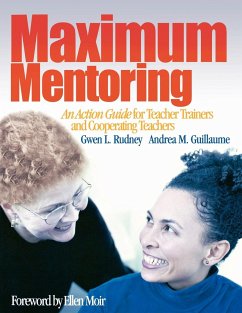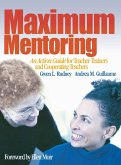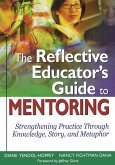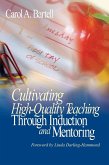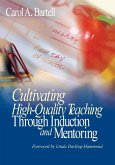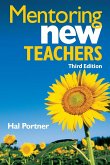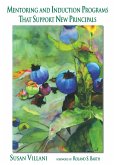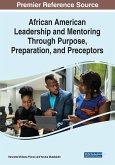Gwen L. Rudney, Andrea M. Guillaume
Maximum Mentoring
An Action Guide for Teacher Trainers and Cooperating Teachers
Gwen L. Rudney, Andrea M. Guillaume
Maximum Mentoring
An Action Guide for Teacher Trainers and Cooperating Teachers
- Broschiertes Buch
- Merkliste
- Auf die Merkliste
- Bewerten Bewerten
- Teilen
- Produkt teilen
- Produkterinnerung
- Produkterinnerung
New teacher development, support, and retention all require intensive levels of one-to-one training and mentoring. Mentors may be cooperating teachers whose classrooms host the field placements of student teachers and interns, they may be mentor teachers in induction programmes, and they may be staff trainers/staff developers. This is an action guide for all mentors. It accompanies the trainer and the co-operating teacher every step of the way through the complexities of the school-based mentoring process to ensure maximum success for both mentor and mentee. Clear coverage of rules, roles,…mehr
Andere Kunden interessierten sich auch für
![Maximum Mentoring Maximum Mentoring]() Gwen L. RudneyMaximum Mentoring80,99 €
Gwen L. RudneyMaximum Mentoring80,99 €![The Reflective Educators Guide to Mentoring The Reflective Educators Guide to Mentoring]() Nancy F. Dana (Fichtman)The Reflective Educators Guide to Mentoring36,99 €
Nancy F. Dana (Fichtman)The Reflective Educators Guide to Mentoring36,99 €![Cultivating High-Quality Teaching Through Induction and Mentoring Cultivating High-Quality Teaching Through Induction and Mentoring]() Carol A. BartellCultivating High-Quality Teaching Through Induction and Mentoring92,99 €
Carol A. BartellCultivating High-Quality Teaching Through Induction and Mentoring92,99 €![Cultivating High-Quality Teaching Through Induction and Mentoring Cultivating High-Quality Teaching Through Induction and Mentoring]() Carol A BartellCultivating High-Quality Teaching Through Induction and Mentoring42,99 €
Carol A BartellCultivating High-Quality Teaching Through Induction and Mentoring42,99 €![Mentoring New Teachers Mentoring New Teachers]() Hal PortnerMentoring New Teachers34,99 €
Hal PortnerMentoring New Teachers34,99 €![Mentoring and Induction Programs That Support New Principals Mentoring and Induction Programs That Support New Principals]() Susan VillaniMentoring and Induction Programs That Support New Principals47,99 €
Susan VillaniMentoring and Induction Programs That Support New Principals47,99 €![African American Leadership and Mentoring Through Purpose, Preparation, and Preceptors African American Leadership and Mentoring Through Purpose, Preparation, and Preceptors]() African American Leadership and Mentoring Through Purpose, Preparation, and Preceptors180,99 €
African American Leadership and Mentoring Through Purpose, Preparation, and Preceptors180,99 €-
-
-
New teacher development, support, and retention all require intensive levels of one-to-one training and mentoring. Mentors may be cooperating teachers whose classrooms host the field placements of student teachers and interns, they may be mentor teachers in induction programmes, and they may be staff trainers/staff developers. This is an action guide for all mentors. It accompanies the trainer and the co-operating teacher every step of the way through the complexities of the school-based mentoring process to ensure maximum success for both mentor and mentee. Clear coverage of rules, roles, relationships, responsibilities, and procedures are accompanied by such hands-on essentials as reproducible forms, reflective exercises and answers to the difficult questions that are sure to arise. Key chapters cover the first week of school; dimensions of teaching; building trusting relationships; school-university supervisory partnerships; observation and feedback; summative evaluation; professional growth and development; and techniques for working with struggling student and novice teachers.
Hinweis: Dieser Artikel kann nur an eine deutsche Lieferadresse ausgeliefert werden.
Hinweis: Dieser Artikel kann nur an eine deutsche Lieferadresse ausgeliefert werden.
Produktdetails
- Produktdetails
- Verlag: Corwin
- Seitenzahl: 190
- Erscheinungstermin: 1. Januar 2003
- Englisch
- Abmessung: 280mm x 216mm x 10mm
- Gewicht: 494g
- ISBN-13: 9780761946366
- ISBN-10: 0761946365
- Artikelnr.: 21028020
- Herstellerkennzeichnung
- Libri GmbH
- Europaallee 1
- 36244 Bad Hersfeld
- gpsr@libri.de
- Verlag: Corwin
- Seitenzahl: 190
- Erscheinungstermin: 1. Januar 2003
- Englisch
- Abmessung: 280mm x 216mm x 10mm
- Gewicht: 494g
- ISBN-13: 9780761946366
- ISBN-10: 0761946365
- Artikelnr.: 21028020
- Herstellerkennzeichnung
- Libri GmbH
- Europaallee 1
- 36244 Bad Hersfeld
- gpsr@libri.de
Gwen L. Rudney, PhD, is an Associate Professor of Education at the University of Minnesota, Morris. A teacher of language arts and social studies at the middle school level for more than a decade, her teaching and research interests include classroom processes, teacher development, multicultural education, and working with parents. She has worked with student teachers and cooperating teachers in regional, national, and international settings. She is coauthor of Maximum Mentoring: An Action Guide for Teacher Trainers and Cooperating Teachers. She enjoys serving as the chair of the Minnesota Teacher of the Year Program. In 2004, she received the University of Minnesota, Morris, Alumni Teaching Award.
Foreword - Ellen Moir Acknowledgments About the Authors 1. Introduction: First Things First Roles for Those Who Mentor Cooperating Teacher Support Provider Peer Coach or Mentor Your Rights and Responsibilities as a Mentor What This Book Does Exercises 1.1 Recording Your Roles and Responsibilities 1.2 Setting a Purpose to Read 1.3 Let
s Go Surfing Now 2. Teacher Development The Concerns and Reflections of Student Teachers Novice Teachers and How They Differ From You The Tasks Novice Teachers Accomplish Knowledge of Pupils Image of Self as Teacher Integrated Procedural Routines Categories of Concern and Changes That Occur Thinking About Your New Teacher Partner
s Thinking Exercises 2.1 Self-Study 2.2 Making Connections 2.3 Study in Pictures 3. Building a Base for the Partnership Building Relationships Through Trust and Understanding Getting to Know Each Other as People Getting to Know Each Other as Professionals Building Effective Communication Strategies Setting and Sharing Expectations Active Listening Ongoing Communication Exercises 3.1 Uncommon Commonalities 3.2 Predictions 3.3 Discussion Starters 3.4 I Need/I Like Statements 3.5 Metaphors for Teaching 3.6 Knowledge Chart: Setting Goals for the Term 4. University Supervision: The Triad "Who Is That Person and Why Is She Here?" Understanding the Essentials of the Supervision Triad Sharing Goals and Appreciating Perspectives Sharing Space and Power Sharing Time and Effort Context for Communication and Collaboration Exercises 4.1 Understanding Expectations 4.2 Preparing for a Supervision Conference 4.3 Rating the University Supervisor, Part 1 4.4 Rating the University Supervisor, Part 2 4.5 Rating Yourself 5. Off and Running: The First Week Using the First Week to Build Your Relationship Building Trust With the Student Teacher Building Trust With the New Teacher Partner Building Communication Structures Clear Expectations Feedback Mechanisms Planning the Student Teaching Experience Becoming Familiar With the Students, Classroom, School, and Local Context Getting to Know the Students Getting to Know the Classroom Getting to Know the School and District Getting to Know the Neighborhood Parting Words Exercises 5.1 First Week: The Off-and-Running Report Card 5.2 Assumption of Responsibility Plan 5.3 Getting to Know Our Classroom 6. Helping Novices Learn the Roles of Teaching The Complexity of Teaching Complex Conditions Teachers
Many Roles Teachers
Visions of Their Work Tensions in Teaching The Moral Dimension of Teaching The Layeredness of the Experience Teacher Partner
s Role Supporting Competence in a Multifaceted Profession Start With a Vision Perceive and Address Classroom Complexity Work Across the Range of Teacher Roles Honor the Tensions of Teaching Attend to the Moral Dimension of Teaching Exercises 6.1 Articulating a Vision of Education 6.2 Looking for Classroom Complexity 6.3 A Few of the Many Roles of Teaching 6.4 Responding to a Case With Moral Implications 7. Observation and Feedback The Power of Feedback Before They Teach While They Learn After the Lesson Formal Observation Scientific Approach Artistic Supervision Clinical Supervision Looking Ahead Exercises 7.1 Joe
s First Lesson Observation 7.2 Practicing the Scientific Aproach 7.3 Practicing the Artistic Approach 7.4 Practicing the Clinical Approach 8. Summative Evaluation The Logic of Evaluation What Will Be Judged? Setting Standards of Performance Data and Documentation Making Data-Based Final Judgments How the Process Can Work for You Preparing the Summative Evaluation Communicating Results Exercises 8.1 The Top Five Skills for Beginning Teachers 8.2 Summative Evaluation: Questions to Ask and Answer 8.3 Measuring Up to the Role of Evaluator 8.4 Evaluating Evaluation 9. Working With a Student Teacher in Trouble What Would You Do? Framing the Struggle Lack of Probable Potential or Presence of Developmental Delay? Lack of Ability or Lack of Teachability? Marginal or Failing Performance? Now What? Helping Your Mentee Understand the Problem Awareness Phase Assistance Phase Making Final Decisions Successful Resolution Exercises 9.1 Framing the Struggle 9.2 Communication of Concern 9.3 Early Interventions 9.4 Preparing for a Difficult Conference 9.5 Conference Format 10. Growing as a Professional Defining Action Research Action Research Conducting Action Research Getting Going in Action Research: A Few Tips Collaboration Peer Collaborations Professional Community Collaborations: Teacher Education Accreditation Advanced Certification and Degrees Certification Graduate Degrees Parting Words Exercises 10.1 Personal Professional Inquiries 10.2 Inquiring Into Action Research 10.3 Investigating National Board Certification 10.4 Building and Sharing Professional Portfolios 10.5 Revising the Book References Index
s Go Surfing Now 2. Teacher Development The Concerns and Reflections of Student Teachers Novice Teachers and How They Differ From You The Tasks Novice Teachers Accomplish Knowledge of Pupils Image of Self as Teacher Integrated Procedural Routines Categories of Concern and Changes That Occur Thinking About Your New Teacher Partner
s Thinking Exercises 2.1 Self-Study 2.2 Making Connections 2.3 Study in Pictures 3. Building a Base for the Partnership Building Relationships Through Trust and Understanding Getting to Know Each Other as People Getting to Know Each Other as Professionals Building Effective Communication Strategies Setting and Sharing Expectations Active Listening Ongoing Communication Exercises 3.1 Uncommon Commonalities 3.2 Predictions 3.3 Discussion Starters 3.4 I Need/I Like Statements 3.5 Metaphors for Teaching 3.6 Knowledge Chart: Setting Goals for the Term 4. University Supervision: The Triad "Who Is That Person and Why Is She Here?" Understanding the Essentials of the Supervision Triad Sharing Goals and Appreciating Perspectives Sharing Space and Power Sharing Time and Effort Context for Communication and Collaboration Exercises 4.1 Understanding Expectations 4.2 Preparing for a Supervision Conference 4.3 Rating the University Supervisor, Part 1 4.4 Rating the University Supervisor, Part 2 4.5 Rating Yourself 5. Off and Running: The First Week Using the First Week to Build Your Relationship Building Trust With the Student Teacher Building Trust With the New Teacher Partner Building Communication Structures Clear Expectations Feedback Mechanisms Planning the Student Teaching Experience Becoming Familiar With the Students, Classroom, School, and Local Context Getting to Know the Students Getting to Know the Classroom Getting to Know the School and District Getting to Know the Neighborhood Parting Words Exercises 5.1 First Week: The Off-and-Running Report Card 5.2 Assumption of Responsibility Plan 5.3 Getting to Know Our Classroom 6. Helping Novices Learn the Roles of Teaching The Complexity of Teaching Complex Conditions Teachers
Many Roles Teachers
Visions of Their Work Tensions in Teaching The Moral Dimension of Teaching The Layeredness of the Experience Teacher Partner
s Role Supporting Competence in a Multifaceted Profession Start With a Vision Perceive and Address Classroom Complexity Work Across the Range of Teacher Roles Honor the Tensions of Teaching Attend to the Moral Dimension of Teaching Exercises 6.1 Articulating a Vision of Education 6.2 Looking for Classroom Complexity 6.3 A Few of the Many Roles of Teaching 6.4 Responding to a Case With Moral Implications 7. Observation and Feedback The Power of Feedback Before They Teach While They Learn After the Lesson Formal Observation Scientific Approach Artistic Supervision Clinical Supervision Looking Ahead Exercises 7.1 Joe
s First Lesson Observation 7.2 Practicing the Scientific Aproach 7.3 Practicing the Artistic Approach 7.4 Practicing the Clinical Approach 8. Summative Evaluation The Logic of Evaluation What Will Be Judged? Setting Standards of Performance Data and Documentation Making Data-Based Final Judgments How the Process Can Work for You Preparing the Summative Evaluation Communicating Results Exercises 8.1 The Top Five Skills for Beginning Teachers 8.2 Summative Evaluation: Questions to Ask and Answer 8.3 Measuring Up to the Role of Evaluator 8.4 Evaluating Evaluation 9. Working With a Student Teacher in Trouble What Would You Do? Framing the Struggle Lack of Probable Potential or Presence of Developmental Delay? Lack of Ability or Lack of Teachability? Marginal or Failing Performance? Now What? Helping Your Mentee Understand the Problem Awareness Phase Assistance Phase Making Final Decisions Successful Resolution Exercises 9.1 Framing the Struggle 9.2 Communication of Concern 9.3 Early Interventions 9.4 Preparing for a Difficult Conference 9.5 Conference Format 10. Growing as a Professional Defining Action Research Action Research Conducting Action Research Getting Going in Action Research: A Few Tips Collaboration Peer Collaborations Professional Community Collaborations: Teacher Education Accreditation Advanced Certification and Degrees Certification Graduate Degrees Parting Words Exercises 10.1 Personal Professional Inquiries 10.2 Inquiring Into Action Research 10.3 Investigating National Board Certification 10.4 Building and Sharing Professional Portfolios 10.5 Revising the Book References Index
Foreword - Ellen Moir Acknowledgments About the Authors 1. Introduction: First Things First Roles for Those Who Mentor Cooperating Teacher Support Provider Peer Coach or Mentor Your Rights and Responsibilities as a Mentor What This Book Does Exercises 1.1 Recording Your Roles and Responsibilities 1.2 Setting a Purpose to Read 1.3 Let
s Go Surfing Now 2. Teacher Development The Concerns and Reflections of Student Teachers Novice Teachers and How They Differ From You The Tasks Novice Teachers Accomplish Knowledge of Pupils Image of Self as Teacher Integrated Procedural Routines Categories of Concern and Changes That Occur Thinking About Your New Teacher Partner
s Thinking Exercises 2.1 Self-Study 2.2 Making Connections 2.3 Study in Pictures 3. Building a Base for the Partnership Building Relationships Through Trust and Understanding Getting to Know Each Other as People Getting to Know Each Other as Professionals Building Effective Communication Strategies Setting and Sharing Expectations Active Listening Ongoing Communication Exercises 3.1 Uncommon Commonalities 3.2 Predictions 3.3 Discussion Starters 3.4 I Need/I Like Statements 3.5 Metaphors for Teaching 3.6 Knowledge Chart: Setting Goals for the Term 4. University Supervision: The Triad "Who Is That Person and Why Is She Here?" Understanding the Essentials of the Supervision Triad Sharing Goals and Appreciating Perspectives Sharing Space and Power Sharing Time and Effort Context for Communication and Collaboration Exercises 4.1 Understanding Expectations 4.2 Preparing for a Supervision Conference 4.3 Rating the University Supervisor, Part 1 4.4 Rating the University Supervisor, Part 2 4.5 Rating Yourself 5. Off and Running: The First Week Using the First Week to Build Your Relationship Building Trust With the Student Teacher Building Trust With the New Teacher Partner Building Communication Structures Clear Expectations Feedback Mechanisms Planning the Student Teaching Experience Becoming Familiar With the Students, Classroom, School, and Local Context Getting to Know the Students Getting to Know the Classroom Getting to Know the School and District Getting to Know the Neighborhood Parting Words Exercises 5.1 First Week: The Off-and-Running Report Card 5.2 Assumption of Responsibility Plan 5.3 Getting to Know Our Classroom 6. Helping Novices Learn the Roles of Teaching The Complexity of Teaching Complex Conditions Teachers
Many Roles Teachers
Visions of Their Work Tensions in Teaching The Moral Dimension of Teaching The Layeredness of the Experience Teacher Partner
s Role Supporting Competence in a Multifaceted Profession Start With a Vision Perceive and Address Classroom Complexity Work Across the Range of Teacher Roles Honor the Tensions of Teaching Attend to the Moral Dimension of Teaching Exercises 6.1 Articulating a Vision of Education 6.2 Looking for Classroom Complexity 6.3 A Few of the Many Roles of Teaching 6.4 Responding to a Case With Moral Implications 7. Observation and Feedback The Power of Feedback Before They Teach While They Learn After the Lesson Formal Observation Scientific Approach Artistic Supervision Clinical Supervision Looking Ahead Exercises 7.1 Joe
s First Lesson Observation 7.2 Practicing the Scientific Aproach 7.3 Practicing the Artistic Approach 7.4 Practicing the Clinical Approach 8. Summative Evaluation The Logic of Evaluation What Will Be Judged? Setting Standards of Performance Data and Documentation Making Data-Based Final Judgments How the Process Can Work for You Preparing the Summative Evaluation Communicating Results Exercises 8.1 The Top Five Skills for Beginning Teachers 8.2 Summative Evaluation: Questions to Ask and Answer 8.3 Measuring Up to the Role of Evaluator 8.4 Evaluating Evaluation 9. Working With a Student Teacher in Trouble What Would You Do? Framing the Struggle Lack of Probable Potential or Presence of Developmental Delay? Lack of Ability or Lack of Teachability? Marginal or Failing Performance? Now What? Helping Your Mentee Understand the Problem Awareness Phase Assistance Phase Making Final Decisions Successful Resolution Exercises 9.1 Framing the Struggle 9.2 Communication of Concern 9.3 Early Interventions 9.4 Preparing for a Difficult Conference 9.5 Conference Format 10. Growing as a Professional Defining Action Research Action Research Conducting Action Research Getting Going in Action Research: A Few Tips Collaboration Peer Collaborations Professional Community Collaborations: Teacher Education Accreditation Advanced Certification and Degrees Certification Graduate Degrees Parting Words Exercises 10.1 Personal Professional Inquiries 10.2 Inquiring Into Action Research 10.3 Investigating National Board Certification 10.4 Building and Sharing Professional Portfolios 10.5 Revising the Book References Index
s Go Surfing Now 2. Teacher Development The Concerns and Reflections of Student Teachers Novice Teachers and How They Differ From You The Tasks Novice Teachers Accomplish Knowledge of Pupils Image of Self as Teacher Integrated Procedural Routines Categories of Concern and Changes That Occur Thinking About Your New Teacher Partner
s Thinking Exercises 2.1 Self-Study 2.2 Making Connections 2.3 Study in Pictures 3. Building a Base for the Partnership Building Relationships Through Trust and Understanding Getting to Know Each Other as People Getting to Know Each Other as Professionals Building Effective Communication Strategies Setting and Sharing Expectations Active Listening Ongoing Communication Exercises 3.1 Uncommon Commonalities 3.2 Predictions 3.3 Discussion Starters 3.4 I Need/I Like Statements 3.5 Metaphors for Teaching 3.6 Knowledge Chart: Setting Goals for the Term 4. University Supervision: The Triad "Who Is That Person and Why Is She Here?" Understanding the Essentials of the Supervision Triad Sharing Goals and Appreciating Perspectives Sharing Space and Power Sharing Time and Effort Context for Communication and Collaboration Exercises 4.1 Understanding Expectations 4.2 Preparing for a Supervision Conference 4.3 Rating the University Supervisor, Part 1 4.4 Rating the University Supervisor, Part 2 4.5 Rating Yourself 5. Off and Running: The First Week Using the First Week to Build Your Relationship Building Trust With the Student Teacher Building Trust With the New Teacher Partner Building Communication Structures Clear Expectations Feedback Mechanisms Planning the Student Teaching Experience Becoming Familiar With the Students, Classroom, School, and Local Context Getting to Know the Students Getting to Know the Classroom Getting to Know the School and District Getting to Know the Neighborhood Parting Words Exercises 5.1 First Week: The Off-and-Running Report Card 5.2 Assumption of Responsibility Plan 5.3 Getting to Know Our Classroom 6. Helping Novices Learn the Roles of Teaching The Complexity of Teaching Complex Conditions Teachers
Many Roles Teachers
Visions of Their Work Tensions in Teaching The Moral Dimension of Teaching The Layeredness of the Experience Teacher Partner
s Role Supporting Competence in a Multifaceted Profession Start With a Vision Perceive and Address Classroom Complexity Work Across the Range of Teacher Roles Honor the Tensions of Teaching Attend to the Moral Dimension of Teaching Exercises 6.1 Articulating a Vision of Education 6.2 Looking for Classroom Complexity 6.3 A Few of the Many Roles of Teaching 6.4 Responding to a Case With Moral Implications 7. Observation and Feedback The Power of Feedback Before They Teach While They Learn After the Lesson Formal Observation Scientific Approach Artistic Supervision Clinical Supervision Looking Ahead Exercises 7.1 Joe
s First Lesson Observation 7.2 Practicing the Scientific Aproach 7.3 Practicing the Artistic Approach 7.4 Practicing the Clinical Approach 8. Summative Evaluation The Logic of Evaluation What Will Be Judged? Setting Standards of Performance Data and Documentation Making Data-Based Final Judgments How the Process Can Work for You Preparing the Summative Evaluation Communicating Results Exercises 8.1 The Top Five Skills for Beginning Teachers 8.2 Summative Evaluation: Questions to Ask and Answer 8.3 Measuring Up to the Role of Evaluator 8.4 Evaluating Evaluation 9. Working With a Student Teacher in Trouble What Would You Do? Framing the Struggle Lack of Probable Potential or Presence of Developmental Delay? Lack of Ability or Lack of Teachability? Marginal or Failing Performance? Now What? Helping Your Mentee Understand the Problem Awareness Phase Assistance Phase Making Final Decisions Successful Resolution Exercises 9.1 Framing the Struggle 9.2 Communication of Concern 9.3 Early Interventions 9.4 Preparing for a Difficult Conference 9.5 Conference Format 10. Growing as a Professional Defining Action Research Action Research Conducting Action Research Getting Going in Action Research: A Few Tips Collaboration Peer Collaborations Professional Community Collaborations: Teacher Education Accreditation Advanced Certification and Degrees Certification Graduate Degrees Parting Words Exercises 10.1 Personal Professional Inquiries 10.2 Inquiring Into Action Research 10.3 Investigating National Board Certification 10.4 Building and Sharing Professional Portfolios 10.5 Revising the Book References Index

